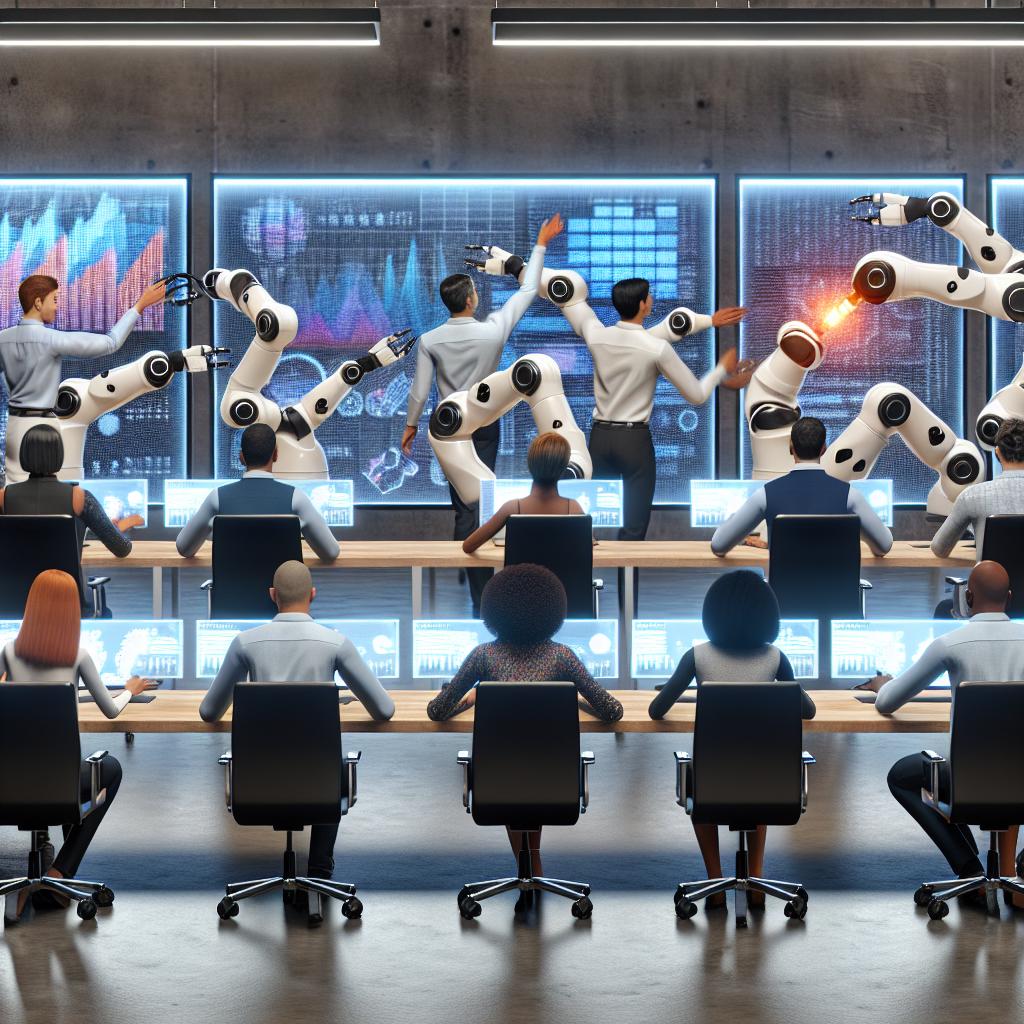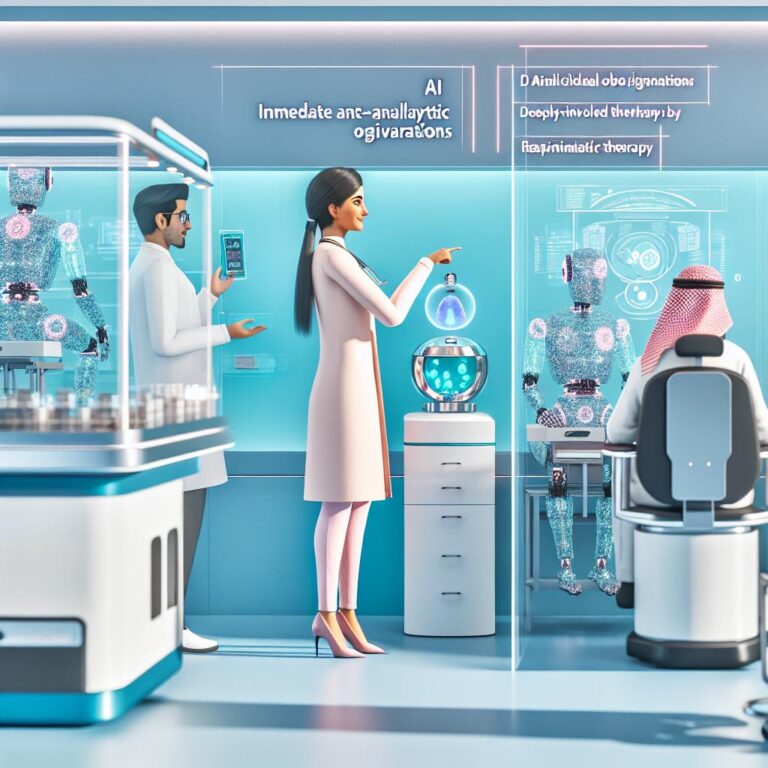AI Transforming Businesses: How Does It Work?
- Intelligent automation merges AI, machine learning, and robotic process automation to handle repetitive tasks, allowing employees to focus on complex work.
- Key components include machine learning and AI for decision-making and RPA for task execution.
- Businesses like banks, retailers, and factories implement it to save time and improve efficiency.
- Benefits include increased productivity and faster decision-making, while challenges involve adoption costs and skill requirements.
- AI enhances business productivity by automating tasks, improving supply chain logistics, and enabling personalized customer interactions through digital assistants.
- Predictive analytics helps tailor services and preempt customer needs.
- AI advancements drive digital transformation and cross-industry innovation, but ethical considerations around data privacy and bias must be addressed to ensure responsible development.
Ever wonder how AI is changing business? Join me as we explore intelligent automation and how it transforms operations. We'll dive into key components like AI technologies and RPA, and discover business strategies that boost efficiency. Plus, learn about the benefits and challenges of adopting these tech marvels. Get ready to understand and enjoy the future of AI in business!
How is intelligent automation revolutionizing business operations?

Intelligent automation is changing how businesses work. It combines AI, machine learning, and robotic process automation. Imagine a smart system that takes over repetitive tasks. It lets people focus on bigger things because the intelligent system handles the rest.
What are the key components of intelligent automation?
Machine learning and AI are like the brain. They learn from data and make decisions. Robotic Process Automation (RPA) acts as the hands. RPA does tasks like data entry, scanning documents, and quickly processing info. When AI technologies and RPA join forces, they create a strong team. Together, they change how businesses work every day.
How are businesses implementing intelligent automation for efficiency?
Some businesses use intelligent automation to save time. For example, banks use it to approve loans faster. Retailers use it for customer support with chatbots, answering simple questions quickly. Even factories use it to keep machines running smoothly. These examples show how automation makes things easier and faster, saving money and improving service.
What are the benefits and challenges of adopting intelligent automation?
Automation boosts productivity by handling boring tasks. This means more time for creative work. But, starting with intelligent automation is not always easy. It needs planning, cost, and skilled people. Also, there are tech challenges and training teams to adapt. Despite these, its ability to enhance work makes it worth the try.
In what ways can AI enhance productivity in business processes?

AI can boost workforce efficiency by automating tasks. It takes on repetitive work that humans usually complete. This means that workers save time and can focus on important tasks. AI systems process data fast, cutting down on errors. This helps make informed decisions quicker than before. Insights from AI can help you decide the best steps to take in operations.
AI transforms supply chain management and logistics through smart solutions. For example, systems can predict demand changes to keep stock at the right levels. AI also helps find the fastest delivery routes, which saves time and gas. Robots in warehouses pick and sort items, speeding up order fulfillment. These improvements increase supply chain efficiency for many businesses.
Companies use AI to streamline operations and boost efficiency. In corporate settings, AI tools have made processes faster and smoother. For example, some banks use AI to handle customer requests, freeing up staff to deal with complex tasks. Retailers harness AI to personalize shopping experiences based on customer behavior. By looking at case studies, it is clear how much AI reshapes business processes.
Which AI-driven solutions are transforming customer service?

AI is changing how we help customers. These smart tools make service faster and better. Digital assistants are one big change. They listen to customers and answer questions. These AI tools learn from every chat, always improving.
How are digital assistants and AI tools improving customer interactions?
Digital assistants like chatbots and voice helpers make things easy. They work all day and night. According to Gleecus, they can solve many problems at once. Unlike humans, they never sleep or get tired. They help customers find what they need fast. Their replies are quick and correct. This helps businesses save time and money.
What is the impact of AI on personalized customer experiences?
AI helps businesses learn more about each customer. It keeps track of what they like. This lets companies offer special deals just for them. They call this personalized marketing. This makes customers feel valued and special. Businesses using AI find that customers buy more because they feel understood.
How can predictive analytics aid in customer service transformations?
Predictive analytics is like a crystal ball for businesses. It uses AI insights to look at past customer actions to predict what they want next. Companies can then change their services to meet those needs. This can stop problems before they start. When companies predict well, customers stay happy and loyal.
What future trends are emerging in AI automation technologies?

How are AI advancements shaping digital transformation strategies?
AI advancements cause big changes in digital transformation strategies. They help firms use data better. This means smarter choices and faster actions. AI allows firms to understand clients better. This leads to improved services and profits. AI trends in industry are helping firms to be more efficient and stay competitive.
What innovations does AI bring to cross-industry applications?
AI is transforming many industries by bringing unique innovations. In healthcare, AI diagnoses diseases earlier. In finance, it detects fraud quickly. Retailers use AI to manage stock and meet demand. AI's role in transport is evolving too. It guides self-driving cars and reduces traffic problems. Each industry uses AI for specific needs, making processes smoother and faster.
How could ethical considerations affect future AI development?
Ethical considerations play a big role in AI development. How a company handles data is important. Problems like privacy and data bias need addressing. Companies must think about AI's impact on jobs. Governance systems should ensure AI acts fairly. If not managed well, these issues could stop AI progress.不断进步
Conclusion
Intelligent automation is changing how businesses run. AI and RPA are streamlining operations, boosting workflow, and reshaping customer service. Yet, companies face challenges in implementation. AI boosts efficiency, enhances supply chains, and personalizes customer service through digital tools. It provides insightful analytics for dynamic customer interactions. As we look forward, AI’s role in digital strategies and cross-industries will grow. But we need to consider ethical issues as AI tech advances. Embrace these tools, and stay ahead in the tech race.







